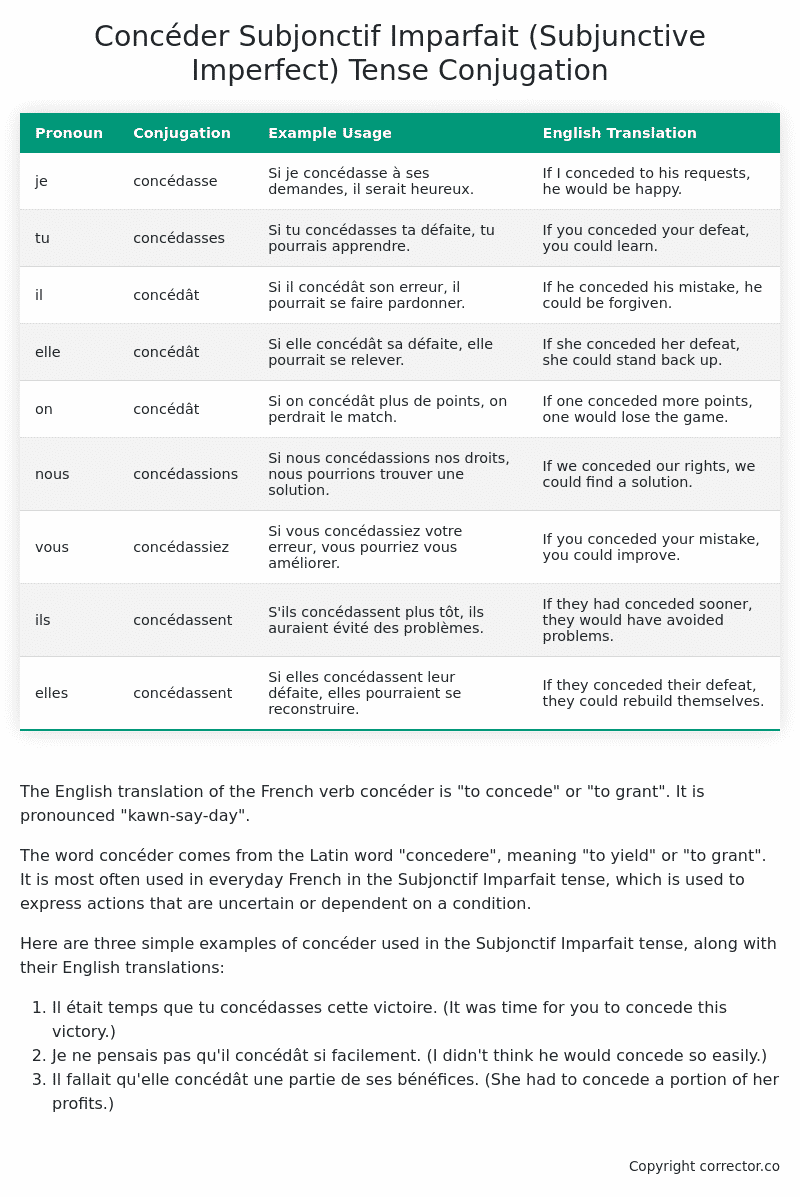Subjonctif Imparfait (Subjunctive Imperfect) Tense Conjugation of the French Verb concéder
Introduction to the verb concéder
The English translation of the French verb concéder is “to concede” or “to grant”. It is pronounced “kawn-say-day”.
The word concéder comes from the Latin word “concedere”, meaning “to yield” or “to grant”. It is most often used in everyday French in the Subjonctif Imparfait tense, which is used to express actions that are uncertain or dependent on a condition.
Here are three simple examples of concéder used in the Subjonctif Imparfait tense, along with their English translations:
- Il était temps que tu concédasses cette victoire. (It was time for you to concede this victory.)
- Je ne pensais pas qu’il concédât si facilement. (I didn’t think he would concede so easily.)
- Il fallait qu’elle concédât une partie de ses bénéfices. (She had to concede a portion of her profits.)
Table of the Subjonctif Imparfait (Subjunctive Imperfect) Tense Conjugation of concéder
| Pronoun | Conjugation | Example Usage | English Translation |
|---|---|---|---|
| je | concédasse | Si je concédasse à ses demandes, il serait heureux. | If I conceded to his requests, he would be happy. |
| tu | concédasses | Si tu concédasses ta défaite, tu pourrais apprendre. | If you conceded your defeat, you could learn. |
| il | concédât | Si il concédât son erreur, il pourrait se faire pardonner. | If he conceded his mistake, he could be forgiven. |
| elle | concédât | Si elle concédât sa défaite, elle pourrait se relever. | If she conceded her defeat, she could stand back up. |
| on | concédât | Si on concédât plus de points, on perdrait le match. | If one conceded more points, one would lose the game. |
| nous | concédassions | Si nous concédassions nos droits, nous pourrions trouver une solution. | If we conceded our rights, we could find a solution. |
| vous | concédassiez | Si vous concédassiez votre erreur, vous pourriez vous améliorer. | If you conceded your mistake, you could improve. |
| ils | concédassent | S’ils concédassent plus tôt, ils auraient évité des problèmes. | If they had conceded sooner, they would have avoided problems. |
| elles | concédassent | Si elles concédassent leur défaite, elles pourraient se reconstruire. | If they conceded their defeat, they could rebuild themselves. |
Other Conjugations for Concéder.
Le Present (Present Tense) Conjugation of the French Verb concéder
Imparfait (Imperfect) Tense Conjugation of the French Verb concéder
Passé Simple (Simple Past) Tense Conjugation of the French Verb concéder
Passé Composé (Present Perfect) Tense Conjugation of the French Verb concéder
Futur Simple (Simple Future) Tense Conjugation of the French Verb concéder
Futur Proche (Near Future) Tense Conjugation of the French Verb concéder
Plus-que-parfait (Pluperfect) Tense Conjugation of the French Verb concéder
Passé Antérieur (Past Anterior) Tense Conjugation of the French Verb concéder
Futur Antérieur (Future Anterior) Tense Conjugation of the French Verb concéder
Subjonctif Présent (Subjunctive Present) Tense Conjugation of the French Verb concéder
Subjonctif Passé (Subjunctive Past) Tense Conjugation of the French Verb concéder
Subjonctif Imparfait (Subjunctive Imperfect) Tense Conjugation of the French Verb concéder (this article)
Subjonctif Plus-que-parfait (Subjunctive Pluperfect) Tense Conjugation of the French Verb concéder
Conditionnel Présent (Conditional Present) Tense Conjugation of the French Verb concéder
Conditionnel Passé (Conditional Past) Tense Conjugation of the French Verb concéder
L’impératif Présent (Imperative Present) Tense Conjugation of the French Verb concéder
L’infinitif Présent (Infinitive Present) Tense Conjugation of the French Verb concéder
Struggling with French verbs or the language in general? Why not use our free French Grammar Checker – no registration required!
Get a FREE Download Study Sheet of this Conjugation 🔥
Simply right click the image below, click “save image” and get your free reference for the concéder Subjonctif Imparfait tense conjugation!

Concéder – About the French Subjonctif Imparfait (Subjunctive Imperfect) Tense
Formation
Common Everyday Usage Patterns
Interactions with Other Tenses
Subjonctif Présent
Indicatif Passé Composé
Conditional
Conditional Perfect
Summary
I hope you enjoyed this article on the verb concéder. Still in a learning mood? Check out another TOTALLY random French verb conjugation!


